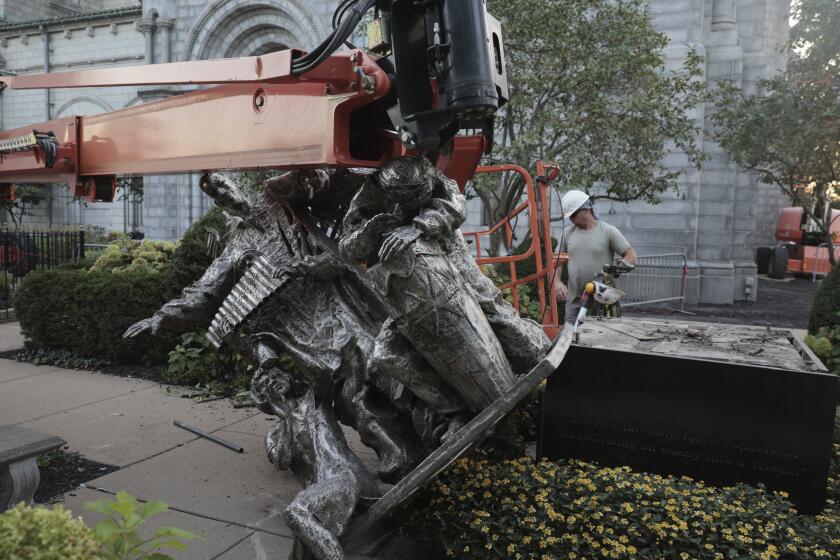Anti-U.S. Sentiment Festers as Order and Calm Prove Elusive
Sheik Jamal Shaker Mahmoud roused the faithful at the Great Mosque here Friday with a simple message: Resist the Americans.
“May God burn the infidel in this house,” said Mahmoud, a white-bearded cleric with arresting eyes and a ready smile that seemed detached from his words. “The Americans should have established a care-taking government by now ....We must trample the Americans with our bare feet, as they do to us with their boots.”
The words from the Sunni Muslim cleric were perhaps not surprising in a city where U.S. soldiers killed two Iraqis this week, the latest in a series of deadly confrontations. But similar messages blared from loudspeakers outside mosques across central Iraq during services Friday, the day that the U.S. civil authority formally disbanded Iraq’s armed forces.
An hour’s drive from Fallouja, in the heart of Baghdad, Sheik Kadhum Abadi bemoaned the decadence -- everything from liquor to Western dress -- that he said the U.S.-led coalition had brought to Iraq.
“The only thing we want is their departure. Let them leave us to rule ourselves,” the young Shiite Muslim cleric, in a dark beard and wearing a white robe and turban, told the thousands who crowded the street in front of the Muhsin mosque in Sadr City, a low-income district of Baghdad formerly known as Saddam City.
In some ways, the Iraqi religious leaders’ lamentations Friday on the state of Western society mirror those emanating from pulpits across the United States each Sunday. Yet here they also reveal the difficulties the coalition faces in meeting high expectations for rapid reconstruction aimed at bringing order and a new government to Iraq six weeks after the fall of Baghdad.
About 150,000 American troops in Iraq are patrolling its cities and guarding key sites, as the Pentagon-run Office of Reconstruction and Humanitarian Assistance works to get electricity, water and an interim authority up and running.
But with drivers freely ignoring newly working traffic lights and women afraid to walk the streets of the capital, coalition efforts are often met, at best, with ambivalence in the mosques that operate as neighborhood and village centers.
“I want a national government that really represents Iraq’s people and meets all its needs,” Muthana Abdel-Wahab, 46, said at Fallouja’s Great Mosque. “But most importantly, we need a government that controls security. We were safe here, because if you went out at 2 in the morning, nobody would stop you. Now it’s unsafe. I don’t believe the broken promises of the Americans. They did nothing -- only came here and occupied our land.”
Across the palm-lined courtyard that separates the mosque from the library and home of Sheik Mahmoud, Fatya Mansour went further.
“We’re looking for a national government to take care of people, calm security and bring jobs,” he said. “If we can’t achieve that, this means the masses will grow, and they’ll turn against the Western troops ... and the American troops will have a very hard time in the Fallouja area. Maybe after midnight, we will attack them.”
Fallouja, in particular, has been a place where tensions have erupted. U.S. troops from the 3rd Armored Cavalry Regiment killed two residents this week after their Bradley fighting vehicle was ambushed on patrol by a rocket-propelled grenade and small arms fire.
U.S. soldiers shot at protesters here April 28 and 30, killing at least 16 and wounding about 78 after weapons were fired by the demonstrators, who claimed the troops were not targeted.
No Americans were injured, but after the April 30 shooting, two grenades were lobbed into a U.S. base, wounding seven.
Even in Sadr City, a predominantly Shiite slum that was neglected and occasionally punished by Saddam Hussein’s Sunni-dominated regime, many residents remain uneasy toward the United States.
Although pleased to be liberated from Hussein, they are anxious for increased security and services. And they are mistrustful of Americans for failing to come to the aid of southern Shiites after encouraging them to rise up against Hussein following the 1991 Persian Gulf War.
Coalition officials insist that it is unreasonable to expect civil order and utilities to be restored so quickly to a war-torn nation long debilitated by international sanctions.
They say they are stepping up security, conducting six raids and 1,528 patrols throughout Iraq between Thursday afternoon and Friday afternoon and detaining 150 people.
Coalition leaders also claim substantial gains in rebuilding the government, although looting and the war have left seven of the nation’s 23 ministries without buildings from which to operate. Today, coalition officials will begin paying civil servants throughout Iraq.
On Friday, L. Paul Bremer III, the American civilian administrator overseeing the reconstruction of Iraq, disbanded the country’s armed forces, two key ministries and several security bodies. Together, the entities had formed the military backbone of the regime, and their dissolution is a symbolic milestone in the coalition’s effort to purge members of Hussein’s Baath Party in postwar Iraq and rebuild the nation’s institutions under an allied administration.
“These actions are part of a robust campaign to show the Iraqi people that the Saddam regime is gone, and will never return,” Bremer said in a statement. The abolished army will be replaced by an Iraqi defense force, called the New Iraqi Corps, that will be “representative of all Iraqis” and eventually enable the country to defend itself, he said.
Military personnel below the rank of colonel will receive salary payments for one month, but as yet the coalition administration said it has no plans to address the future of the estimated 300,000 members of Hussein’s armed forces. “The unemployed soldiers are a huge concern from both a security and economic standpoint,” said Army Lt. Gen. David McKiernan, the top U.S. military official in Iraq.
More to Read
Sign up for Essential California
The most important California stories and recommendations in your inbox every morning.
You may occasionally receive promotional content from the Los Angeles Times.










